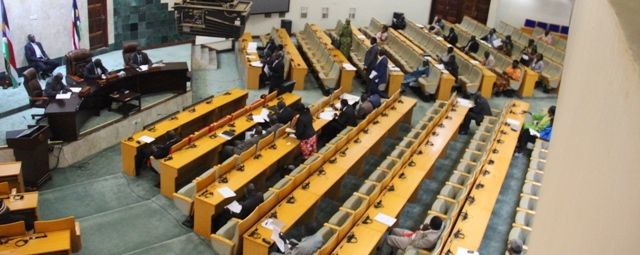A member of South Sudan’s parliament says the decision by the Council of Ministers to allocate funding for elections without parliamentary approval is “unacceptable” and “unconstitutional.”
“That amount needs to be approved by the parliament,” said MP Onyoti Adigo, who is head of the SPLM-DC caucus. “In the budget there was nothing of that kind.”
South Sudan’s recently announced elections budget is 1.5 billion South Sudanese pounds, which is equivalent to more than 10% of the 2014/2015 annual budget.
According to Adigo, this “huge amount of money” was not itemized in the annual budget for 2015. Only a small amount of money was allocated to the Elections Commission for normal operations, but nothing for actual costs of an election.
If this were true, then the president would need to seek parliamentary approval for the allocation of the election funds, because Article 88 (6) of the Constitution forbids money to be “spent on an item that is not provided for in the budget without the approval of the National Legislative Assembly.”
In an interview with Radio Tamazuj on Wednesday, Adigo stressed that the parliament is the government body competent to authorize allocation of funds, not the Council of Ministers.
“Completely they cannot,” he said, referring to the Council of Ministers. “The right procedure is to let them approve that and to present to parliament as a supplementary budget – because it is not within the budget.”
“Up to now they did not seek any parliamentary approval. I don’t know why, because maybe the parliament is now on recess, but still they will not do that without parliamentary approval.”
Adigo also stressed that a census should be conducted before the election is held. “The census will be very expensive,” he also noted, stressing that peace should come first and refugees should return home before census.
Political battle
South Sudan’s ruling party SPLM-Juba is scrambling to prepare for elections because the constitutional legitimacy of their leader Salva Kiir ends in July 2015. South Sudan’s constitution states in Article 100, “The tenure of the office of the President of the Republic of South Sudan shall be four years, commencing from July 9, 2011.”
The alternative to an election would be a constitutional amendment revising the end date of the term of the president. Such a clause potentially could be incorporated into the terms of a peace deal and adopted into the constitution as an amendment.
But this option has not been openly endorsed by anyone in government.
Meanwhile, if Kiir decides to go forward with plans for elections he faces a potential challenge in parliament, where since October last year he ran into repeated obstacles in his efforts to pass a security bill requiring national security officers to swear loyalty before him and granting them special powers of warrantless arrest.
Adigo says that the SPLM faction led by Salva Kiir will face “a problem” if it tries to move forward without parliamentary approval for the elections funding. “If they will not seek parliamentary approval then it is a violation of the constitution and it is a problem between parliament and the executive,” he said.
“This is the most important thing: the need for parliament to make accountability to the executive whenever they violate the constitution or whenever they do make advances for loans without the knowledge of parliament – so these are things that are unacceptable.”




